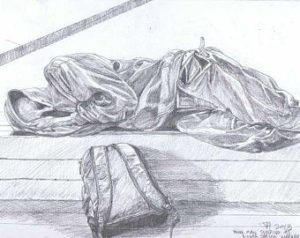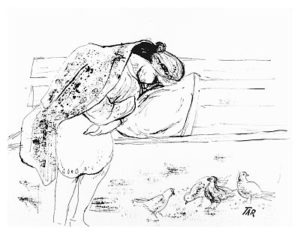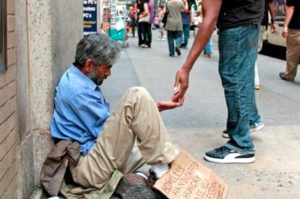DJB comments on “Federal Hills Homeless”
“Homelessness, rather, America’s response to our homeless population, has long sickened me. Here is one of my outbursts against the validated cruelty we inflict on poor people. BTW, my use of the nom de plume Pru Holt represents a lesson in freelancing. At the time (Summer 1990), I had a relationship with The Baltimore Sun, which was regularly publishing my writing. For whatever reason, The Sun passed on this work. I didn’t want to alienate the city’s most widely distributed newspaper which had taken me under its wing. It would be an affront for my byline to show up in the city’s competing paper, The Evening Sun, which was owned by the same company but still operated with a separate editorial staff, so competition between them remained real. I changed the name on the manuscript and submitted it. It was more important to me to get this said than it was to get my name in print. Typical Dennis. As I read it today, the piece has a breathless quality, the result of my rush to write. Newspaper obits have a short shelf life.”
Federal Hill merchants sweep out the unsightly homeless
Pru Holt
The nation’s foremost activist for the homeless, Mitch Snyder, has taken his life. What is there to say? Lacking words, I am compelled instead to blow the whistle on the recent turn of events in my neighborhood, Federal Hill. Hold your ears.
This is a small act of defiance against a big onslaught of intolerance, but it’s the least I can do, and I’m confident Mitch Snyder would have approved.
 My neighborhood is speedily being restored to red-brick splendor and boutique perfection. Yet, homeless men and women are abundant here, particularly in the commercial districts of Light and Charles Streets, in the vicinity of Cross Street Market. The homeless have been in abundance all four years I’ve lived in the area.
My neighborhood is speedily being restored to red-brick splendor and boutique perfection. Yet, homeless men and women are abundant here, particularly in the commercial districts of Light and Charles Streets, in the vicinity of Cross Street Market. The homeless have been in abundance all four years I’ve lived in the area.
It is rare to walk three blocks without being solicited for spare change. Sometimes I give, sometimes I don’t, but I have never been harassed or cursed, nor have I ever avoided a business because a panhandler stood outside its doors. I realize this may not be true of others.
 Now, many of the merchants of Federal Hill have mounted a campaign to rid the neighborhood of street people. There are signs in shop windows displaying a begging hand inside the international circle-and-slash symbol. “PLEASE DO NOT GIVE TO PANHANDLERS.”
Now, many of the merchants of Federal Hill have mounted a campaign to rid the neighborhood of street people. There are signs in shop windows displaying a begging hand inside the international circle-and-slash symbol. “PLEASE DO NOT GIVE TO PANHANDLERS.”
There is even an anti-loitering sign on the door of the Salvation Army on Light Street.
In the past few months, I have witnessed numerous merchants stepping out of their shops onto the sidewalk to give tongue-lashings to street regulars, that is, homeless people who live on the wide sidewalks of this newly prosperous neighborhood, where there is no major soup kitchen effort.
The bus bench at the corner of Light and Cross, which has long been a place of benign assemblage for five to 15 homeless people, has been removed.
The rising hostility directed toward homeless people in Federal Hill is palpable. It is clear: The business community wants to be rid of its sidewalk squatters.
 I first noticed this at Christmas. A makeshift Santa’s cottage was erected for the holidays. A man dressed as Santa stood in its doorway for hours each day, handing out free candy to good girls and boys. When homeless people approached for candy, they were denied – by Santa Claus.
I first noticed this at Christmas. A makeshift Santa’s cottage was erected for the holidays. A man dressed as Santa stood in its doorway for hours each day, handing out free candy to good girls and boys. When homeless people approached for candy, they were denied – by Santa Claus.
Mitch Snyder’s Community for Creative Non-Violence often antagonized on behalf of the homeless. He held hunger strikes. He persuaded celebrities to come out onto the streets to feel what life out there was like. He made headlines that made many of us uneasy over our lack of concern for the less fortunate.
Now, Mitch Snyder is dead, and while the reasons for his suicide were complex, it is said he was profoundly depressed over the Washington, D.C. City Council’s repeal of the city’s “right to shelter” law for which Snyder had crusaded.
 Federal Hill appears to be following D.C.’s lead.
Federal Hill appears to be following D.C.’s lead.
Media attention on the homeless always ebbs during warm months. It’s news when people suffer in the cold, but not when they go hungry in the sunshine. But the merchants of Federal Hill are acutely aware of the homeless this summer and are likely to remain so until they have driven these unsightly people from their sight.
DJB comments: “That’s a 700-word version of this work. To see what it looks like when a publication offers you 1,150 words, click below.”
No Place Like Home

DJB takes us inside a Baltimore soup kitchen and outside onto the streets to hear from its patrons. Click below to hear this iconic radio documentary.
